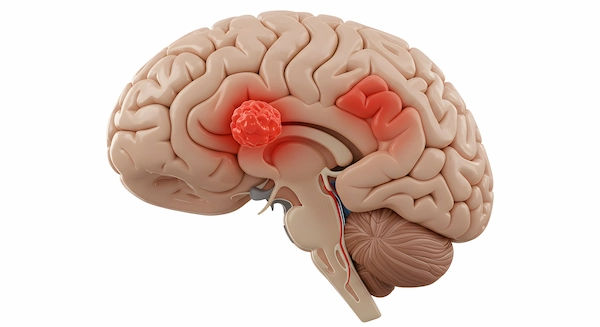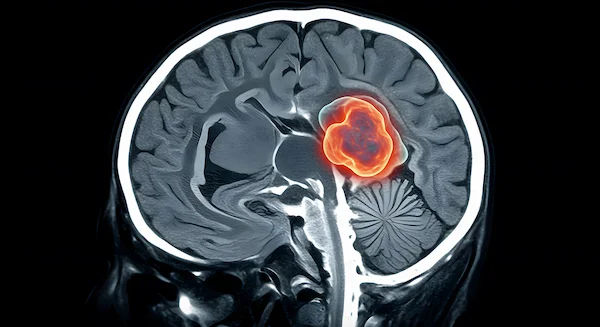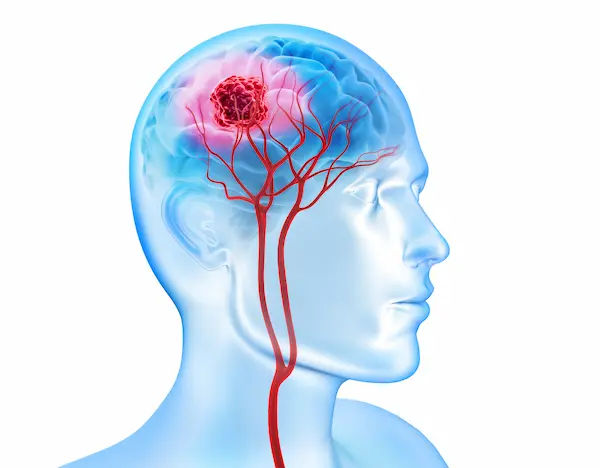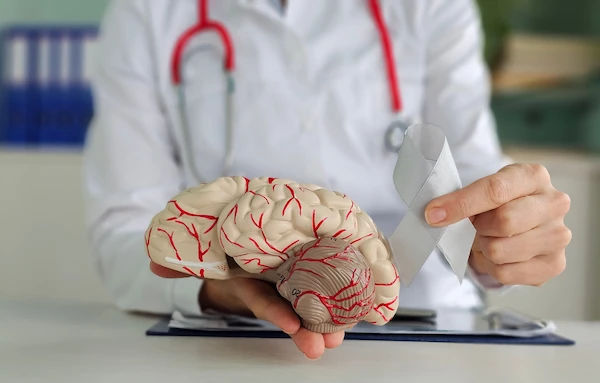Guide to Lifestyle Choices And Brain Tumour Risk
Explore how lifestyle choices impact brain health and influence the risk of developing tumours, with tips for prevention and well-being.

Written by Dr. Mohammed Kamran
Reviewed by Dr. Rohinipriyanka Pondugula MBBS
Last updated on 13th Jan, 2026

Introduction
When we think about brain tumour causes, our minds often jump to factors beyond our control: genetics, age, or rare environmental exposures. But what about the daily choices we make? The connection between lifestyle and brain tumour risk is a complex and evolving area of science. While it's crucial to understand that no specific diet or exercise regimen can guarantee prevention, a growing body of research suggests that our overall way of living may play a significant role in supporting brain health and potentially influencing risk. This article moves beyond the myths to explore the tangible links between your daily habits, from the food on your plate to your sleep patterns and your neurological well-being. We'll sift through the evidence, separate fact from fiction, and provide a practical guide to the lifestyle choices that can help you build a healthier foundation for your brain. The goal is not fear, but empowerment through knowledge.
Understanding Brain Tumours: More Than Just One Disease
Before diving into lifestyle factors, it's essential to understand what we're dealing with. A brain tumour is an uncontrolled growth of cells within the brain. However, not all tumours are the same, and this distinction is critical when discussing risk.
Primary vs. Metastatic Brain Tumours: A Crucial Difference
- Primary Brain Tumours: These originate in the brain itself. Examples include gliomas (like glioblastoma) and meningiomas. Their causes are largely unknown, and research into lifestyle links is most relevant here, though still emerging.
- Metastatic Brain Tumours: These are secondary tumours that have spread to the brain from cancer elsewhere in the body (e.g., lung, breast, skin). For these, lifestyle choices that reduce the risk of those primary cancers (like not smoking to prevent lung cancer) indirectly reduce the risk of brain metastases.
Known Risk Factors: What Science Has Confirmed
The most well-established risk factors are generally non-modifiable:
- Ionising Radiation: Exposure to high doses, such as from radiation therapy for previous cancers, is the strongest known environmental risk.
- Family History and Genetic Syndromes: A small percentage of brain tumours are linked to inherited genetic conditions like Neurofibromatosis.
- Age: Risk increases with age, though certain types are more common in children.
Understanding that these are the primary drivers helps put the role of lifestyle into perspective: it's a potential modifier of background risk, not a primary cause.
Consult an Oncologist for the best advice
The Lifestyle Connection: What Can We Actually Control?
While we can't change our genes or age, the field of epigenetics shows how environmental and lifestyle factors can influence how our genes are expressed. This is where your daily choices become powerful.
The Powerful Role of Diet and Nutrition
Diet is one of the most studied areas. The hypothesis is that certain foods can reduce chronic inflammation and oxidative stress, two processes linked to cancer development.
The Anti-Inflammatory Shield: Foods to Embrace
A Mediterranean-style diet rich in antioxidants and anti-inflammatory compounds is consistently associated with better health outcomes. Focus on:
- Colorful Fruits and Vegetables: Berries, leafy greens, and tomatoes are packed with vitamins and phytochemicals that
combat oxidative damage. - Healthy Fats: Omega-3 fatty acids found in fatty fish (salmon, mackerel), walnuts, and flaxseeds are known for their
anti-inflammatory properties. - Whole Grains and Legumes: These provide fibre and essential nutrients that support overall cellular health.
Potential Risks: Foods to Consume in Moderation
- Processed Meats: Some studies have suggested a potential, though weak, link between high consumption of processed meats and an increased risk of glioma. The evidence is not conclusive, but moderation is wise.
- High-Sugar and Ultra-Processed Foods: These can drive inflammation and obesity, which is a known risk factor for several cancers.
Exercise: Boosting Brain Health Beyond the Body
Regular physical activity is a cornerstone of cancer prevention. It helps maintain a healthy weight, reduces inflammation, improves insulin sensitivity, and boosts the immune system. While direct studies on exercise and primary brain tumour risk are limited, its proven benefits for reducing the risk of other cancers (like colon and breast cancer) make it a highly recommended lifestyle component for overall well-being.
Smoking and Alcohol: Clearing the Air on Direct Links
- Smoking: The evidence linking smoking directly to primary brain tumours is mixed and inconclusive. However, smoking is a leading cause of lung cancer, which frequently metastasises to the brain. Therefore, quitting smoking is one of the most effective ways to reduce your overall risk of a brain tumour linked to metastasis.
- Alcohol: Most major studies have not found a consistent link between moderate alcohol consumption and brain tumour risk. Heavy drinking, however, compromises overall health and should be avoided.
Sleep, Stress, and Your Brain's Resilience
This is an area of growing interest. Chronic stress and poor sleep can lead to elevated cortisol levels and increased inflammation.
- Sleep: During deep sleep, the brain's glymphatic system activates, clearing out waste products that accumulate during the day. Prioritising 7-9 hours of quality sleep is like giving your brain a nightly detox.
- Stress Management: Chronic stress weakens the immune system. Practices like meditation, yoga, or even daily walks can help manage stress levels, contributing to a healthier internal environment.
Debunking Common Brain Tumour Myths
It's just as important to know what doesn't cause brain tumours.
- Mobile Phones: Despite decades of research, major studies from the World Health Organisation have found no consistent evidence that radiofrequency waves from mobile phones increase brain tumour risk.
- Power Lines: The low-frequency energy from power lines is not ionising radiation and has not been proven to cause cancer.
- Head Injuries: A link to certain rare types of brain tumours (like meningiomas) has been suggested in some studies, but the evidence is not strong enough to be considered a major risk factor for most people.
When to Seek Professional Advice
Being proactive about your health also means knowing when to consult an expert. If you experience persistent symptoms like new, severe headaches, unexplained nausea, vision changes, seizures, or cognitive difficulties, it's essential to get a professional evaluation. If symptoms persist beyond two weeks, consult a doctor online with Apollo24|7 for further evaluation. Early consultation is always the best course of action.
Conclusion & Call to Action
The relationship between lifestyle choices and brain tumour risk is not about finding a magic bullet. Instead, it's about building a foundation of health that supports your body's natural defence systems. By adopting a balanced diet, staying physically active, managing stress, and getting quality sleep, you are taking proactive steps to reduce inflammation, support immune function, and promote overall cellular health. While science continues to unravel the specifics, these principles are universally beneficial. View your daily habits as a long-term investment in your brain's vitality. Start with one positive change today, whether it's adding an extra vegetable to your dinner or taking a 20-minute walk, and build from there. Your brain will thank you for a lifetime.
Consult an Oncologist for the best advice
Consult an Oncologist for the best advice

Dr.sanchayan Mandal
Medical Oncologist
17 Years • MBBS, DrNB( MEDICAL ONCOLOGY), DNB (RADIOTHERAPY),ECMO. PDCR. ASCO
Kolkata
Dr. Sanchayan Mandal Oncology Clinic, Kolkata

Dr Gowshikk Rajkumar
Oncologist
10 Years • MBBS, DMRT, DNB in Radiation oncology
Bengaluru
Apollo Clinic, JP nagar, Bengaluru

Dr. Vishwanath S
Oncologist
8 Years • MBBS, MD, DM, Fellowship at MD Anderson Cancer Center
Bengaluru
Apollo Spectra Hospitals, Koramangala, Bengaluru

Dr. Sanchayan Mandal
Medical Oncologist
17 Years • MBBS, DrNB( MEDICAL ONCOLOGY), DNB (RADIOTHERAPY),ECMO. PDCR. ASCO
Kolkata
MCR SUPER SPECIALITY POLY CLINIC & PATHOLOGY, Kolkata

Dr. Harsh J Shah
Surgical Oncologist
15 Years • MS, MCh (GI), DrNB (GI)
Ahmedabad
Apollo Hospitals Gandhinagar, Ahmedabad
Consult an Oncologist for the best advice

Dr.sanchayan Mandal
Medical Oncologist
17 Years • MBBS, DrNB( MEDICAL ONCOLOGY), DNB (RADIOTHERAPY),ECMO. PDCR. ASCO
Kolkata
Dr. Sanchayan Mandal Oncology Clinic, Kolkata

Dr Gowshikk Rajkumar
Oncologist
10 Years • MBBS, DMRT, DNB in Radiation oncology
Bengaluru
Apollo Clinic, JP nagar, Bengaluru

Dr. Vishwanath S
Oncologist
8 Years • MBBS, MD, DM, Fellowship at MD Anderson Cancer Center
Bengaluru
Apollo Spectra Hospitals, Koramangala, Bengaluru

Dr. Sanchayan Mandal
Medical Oncologist
17 Years • MBBS, DrNB( MEDICAL ONCOLOGY), DNB (RADIOTHERAPY),ECMO. PDCR. ASCO
Kolkata
MCR SUPER SPECIALITY POLY CLINIC & PATHOLOGY, Kolkata

Dr. Harsh J Shah
Surgical Oncologist
15 Years • MS, MCh (GI), DrNB (GI)
Ahmedabad
Apollo Hospitals Gandhinagar, Ahmedabad
More articles from Brain Tumor
Frequently Asked Questions
1. Can a specific diet, like keto, prevent brain tumours?
While the ketogenic diet is sometimes used as a supportive therapy under medical supervision for certain individuals, there is no conclusive evidence that it can prevent brain tumours. A balanced, anti-inflammatory diet like the Mediterranean diet is generally recommended for overall cancer prevention.
2. Are there any vitamins or supplements that can reduce brain tumour risk?
No specific supplement has been proven to prevent brain tumours. In fact, high-dose supplements can sometimes be harmful. It's best to focus on obtaining nutrients from a varied diet. If you are concerned about deficiencies, a doctor can recommend tests. Apollo24|7 offers a convenient home collection for tests like vitamin D or HbA1c to help you monitor your health.
3. Is the risk of developing a brain tumour hereditary?
In most cases, no. Only about 5-10% of brain tumours are linked to inherited genetic conditions. However, having a first-degree relative (parent, sibling) with a brain tumour can slightly increase your risk. Discuss any strong family history with your doctor.
4. How much does exercise contribute to lowering brain tumour risk?
The direct contribution is difficult to quantify, but exercise is a key component of a healthy lifestyle that reduces systemic inflammation and helps prevent obesity, both of which are underlying risk factors for many cancers.
5. Should I be worried about using a smartphone or Bluetooth headphones?
Based on the current body of scientific evidence, there is no established cause-and-effect link between the non-ionising radiation from these devices and brain tumours. Public health agencies consider them safe for general use.




